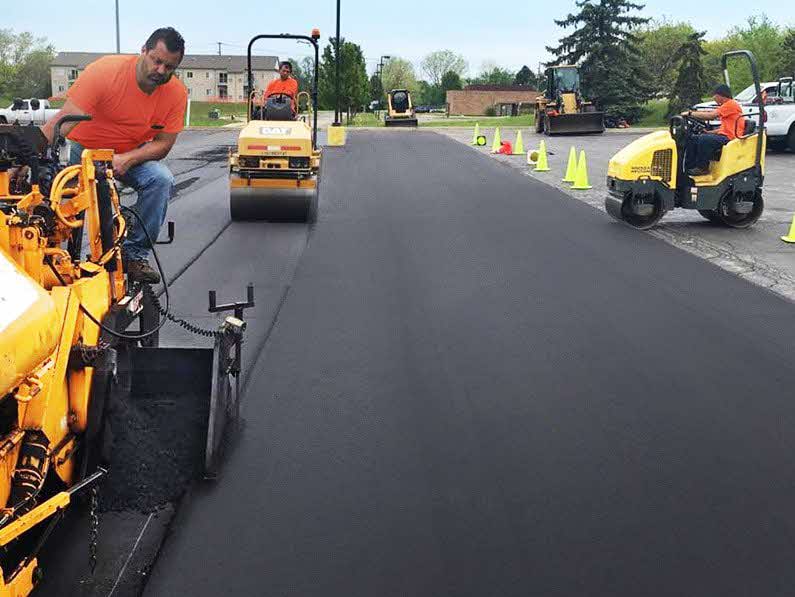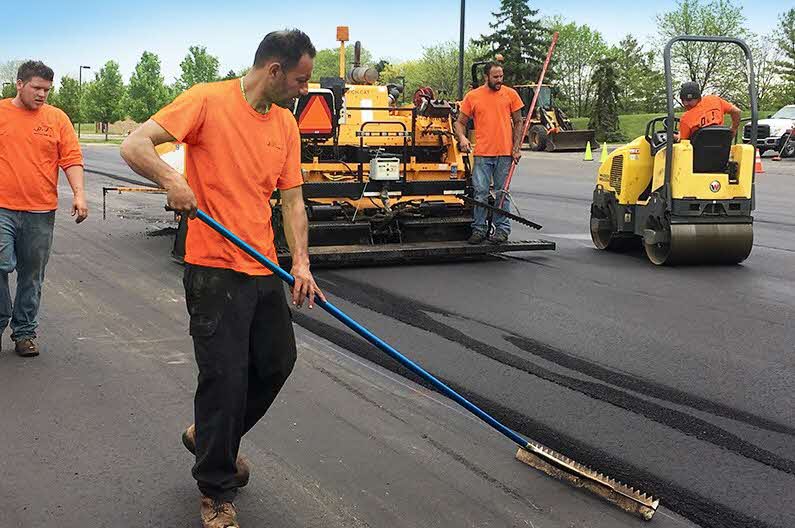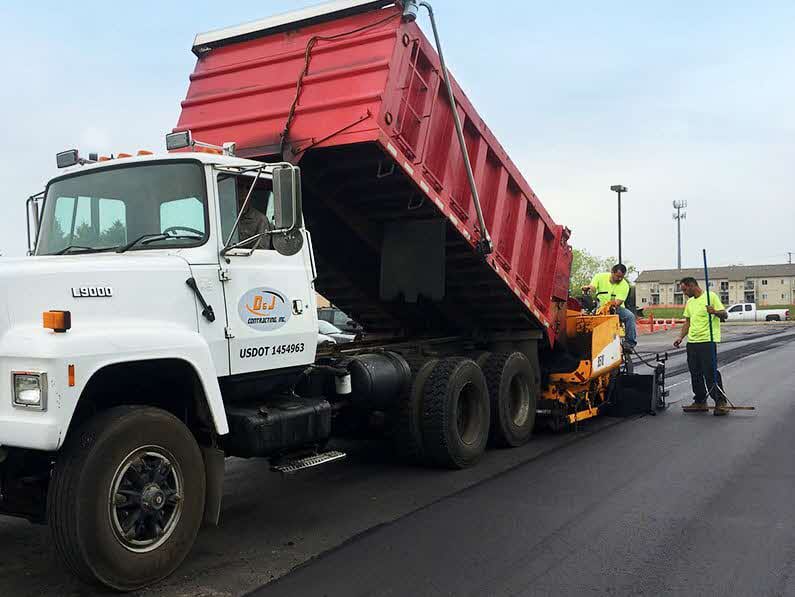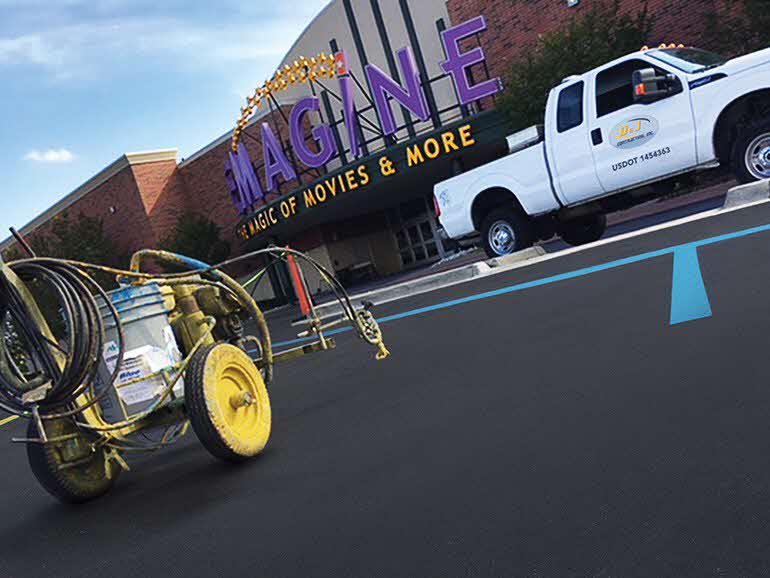Asphalt vs Concrete Meade Michigan
We Are Locally Owned
& Operated For 36 Years
Contact Us Today!
About Asphalt vs Concrete
Introduction
In the world of commercial properties homes, the decision between asphalt and concrete for driveways is a common dilemma. Despite serving the same purpose, these two materials come with their own distinct sets of characteristics, costs, and maintenance needs. This comprehensive guide aims to give you valuable insight into the ‘Asphalt vs Concrete’ debate, aiding your decision-making process. We will delve into supporting topics like ‘Blacktop vs Concrete driveway cost,’ ‘Asphalt driveway cost vs concrete’ and more.
Understanding Asphalt vs Concrete
Asphalt, often referred to as blacktop, is a combination of aggregate, filler, and a binder known as bitumen. Its construction involves the application of a layer of hot asphalt over a bed of aggregate, before compacting it. Alternatively, concrete involves pouring a mixture of cement, aggregate, and water into a frame. It spreads, levels out, and hardens over time into a solid mass. Understanding the pros and cons of both Asphalt and Concrete is critical in deciding their potential application in your commercial property.
Asphalt and Blacktop Driveway vs Concrete
Asphalt driveways have certain advantages. Its black color draws heat from the sun, keeping it warm during winter and preventing the accumulation of snow. This is a feature that might suit colder regions. Additionally, asphalt driveways often cost less to install than concrete ones, making them popular among budget-conscious property owners. On the other hand, with the black color absorbing heat, it can lead to a hotter driveway during the summer, which can cause some discomfort.
Conversely, a concrete driveway offers a neutral and reflective surface. This makes it cooler during the summer but could pose the risk of becoming icy in the winter. Concrete driveways are known for giving a cleaner, polished look that can be colored or stamped with decorative designs. Also, they tend to be more durable, requiring less maintenance than asphalt driveways.
Cost Comparison: Asphalt Driveway vs Concrete
When considering the ‘Cost of Asphalt vs Concrete,’ remember that this can play a significant role in your final decision. The average cost of installing an asphalt driveway is generally less than that of a concrete driveway. However, bear in mind that asphalt requires a good deal of maintenance, which can add to its lifecycle costs through regular sealing and repairs.
Regarding the cost of blacktop vs concrete, the less expensive nature of asphalt material and installation might initially seem appealing. However, the long-term durability and lower maintenance cost of a concrete driveway can often lead to more significant savings over time. Depending on your budget and long-term plans, either choice could be the most cost-effective option.
Concrete vs Pavement Driveway and Pavers
Regarding ‘Concrete vs pavement driveway,’ it’s essential to distinguish between the terms ‘pavement’ and ‘pavers.’ Pavement generally refers to a covering or “paving” of either asphalt or concrete. Meanwhile, pavers are individual pieces of masonry – usually brick or stone – arranged to form a continuous, hard-wearing surface. Paver driveways provide a more decorative and personalized aesthetic than asphalt or concrete paving, albeit at a higher cost.
The ‘Paver driveway cost vs concrete’ or ‘Driveway concrete vs pavers cost’ can swing dramatically. Pavers are typically more expensive to install due to the labor-intensive process of laying each piece by hand. However, their durability, longevity, and ability to withstand harsh weather can save property owners considerable maintenance costs in the long run.
It would be remiss to sign off without considering ‘Asphalt vs Paver driveway.’ While asphalt offers a smooth, sleek finish and cost-effectiveness, pavers add a touch of elegance and luxury. Asphalt surfaces usually require little work and money to install, but a paver driveway can increase the curb appeal and value of a property significantly.
Conclusion
In conclusion, the choice between asphalt and concrete driveways for your commercial property rests largely on your preferences, budget, aesthetics, and climate conditions. Whether you choose concrete, asphalt or pavers, your driveway is an investment that should enhance your property’s value and durability. We hope this comprehensive guide on ‘Asphalt vs Concrete’ has provided valuable insight to inform your decision, and we encourage you to further research the topic to discover which of these options will best suit your specific needs.
Act Now!
If you need expert guidance or professional services for installing or maintaining an asphalt, concrete or paver driveway, don’t hesitate to contact us. Take advantage of our extensive experience and expertise in the field to ensure a smooth and successful completion of your project.
Contact Us Today for a FREE
Asphalt vs Concrete Quote






About Meade, Michigan
History
The founders of Macomb Township arrived in the early 19th century in search of flat and fertile farmland, like that near the Clinton River. Many of these early settlers were of German descent, and the German influences remain today. The Township of Macomb was officially approved by the Legislative Council on March 7, 1834.
The township was named in honor of General Alexander Macomb, who was a highly decorated veteran of the War of 1812; his successful mercantile family owned most of Macomb County at one time.
Macomb Township was a large part of the lumber and logging industry of southeast Michigan in the late 19th century and early 20th century. Logs would be transported south from Wolcott Mill in Ray Township, down the Middle Branch of the Clinton River to sawmills. Romeo Plank Road is a historic route that follows the river on its western side.
Macomb Township experienced significant growth during the period of 2000–2008, boasting a 48% increase in population.
Geography
Macomb Township is at the geographic center of Macomb County. Mount Clemens, the county seat, is 7 miles (11 km) to the south, and downtown Detroit is 26 miles (42 km) to the south-southwest.
According to the U.S. Census Bureau, the township has a total area of 36.35 square miles (94.15 km), of which 36.25 square miles (93.89 km2) are land and 0.09 square miles (0.23 km), or 0.26%, are water.
Communities
- Macomb (or Macomb Corners) is located in the northwest part of the township at 42°42′03″N 82°57′33″W / 42.70083°N 82.95917°W on Romeo Plank Road at 25 Mile Road, near the Middle Branch of the Clinton River.
- Meade is located in the northeast portion of the township at 42°43′03″N 82°52′26″W / 42.71750°N 82.87389°W on the boundary with Ray Township at 26 Mile Road and North Avenue.
- Waldenburg is located in the central portion of the township at 42°39′26″N 82°56′15″W / 42.65722°N 82.93750°W, a few miles south of Macomb on Romeo Plank Road and the Clinton River, chiefly in the 22 Mile Road area.
Demographics
| Race / Ethnicity (NH = Non-Hispanic) | Pop 2000 | Pop 2010 | Pop 2020 | % 2000 | % 2010 | % 2020 |
|---|---|---|---|---|---|---|
| White alone (NH) | 47,968 | 70,906 | 77,042 | 95.03% | 89.10% | 84.05% |
| Black or African American alone (NH) | 420 | 3,096 | 4,627 | 0.83% | 3.89% | 5.05% |
| Native American or Alaska Native alone (NH) | 88 | 136 | 99 | 0.17% | 0.17% | 0.11% |
| Asian alone (NH) | 710 | 2,446 | 3,198 | 1.41% | 3.07% | 3.49% |
| Pacific Islander alone (NH) | 4 | 15 | 19 | 0.01% | 0.02% | 0.02% |
| Other race alone (NH) | 27 | 72 | 216 | 0.05% | 0.09% | 0.24% |
| Mixed race or Multiracial (NH) | 526 | 1,106 | 3,603 | 1.04% | 1.39% | 3.93% |
| Hispanic or Latino (any race) | 735 | 1,803 | 2,859 | 1.46% | 2.27% | 3.12% |
| Total | 50,478 | 79,580 | 91,663 | 100.00% | 100.00% | 100.00% |
As of the census of 2010, there were 79,580 people and 27,585 households in the township. The population density was 2,196.8 inhabitants per square mile (848.2/km2). There were 27,585 housing units. The racial makeup of the township was 90.5% White, 3.9% African American, 0.2% Native American, 3.1% Asian, 0.0% Pacific Islander, 0.7% from other races, and 1.6% from two or more races. Hispanic or Latino of any race were 2.3% of the population.
As of the census of 2000, there were 50,478 people, 16,946 households, and 14,065 families residing in the township. The population density was 1,391.7 inhabitants per square mile (537.3/km2). There were 17,922 housing units at an average density of 494.1 per square mile (190.8/km). The racial makeup of the township was 96.12% White, 0.84% African American, 0.19% Native American, 1.41% Asian, 0.01% Pacific Islander, 0.31% from other races, and 1.12% from two or more races. Hispanic or Latino of any race were 1.46% of the population.
There were 16,946 households, out of which 45.3% had children under the age of 18 living with them, 73.7% were married couples living together, 6.5% had a female householder with no husband present, and 17.0% were non-families. 13.7% of all households were made up of individuals, and 3.9% had someone living alone who was 65 years of age or older. The average household size was 2.97 and the average family size was 3.30.
In the township the population was spread out, with 30.2% under the age of 18, 6.9% from 18 to 24, 35.1% from 25 to 44, 20.3% from 45 to 64, and 7.4% who were 65 years of age or older. The median age was 34 years. For every 100 females, there were 99.6 males. For every 100 females age 18 and over, there were 97.3 males.
Education
The public school districts that serve residents of Macomb Township are Chippewa Valley Schools, L’Anse Creuse Public Schools, New Haven Community Schools and Utica Community Schools. For public library services, the Township is served by the Clinton-Macomb Public Library district.
Contact Us Today for a FREE
Asphalt vs Concrete Quote
Our Asphalt vs Concrete services are available in Meade as well as all of Macomb County.
Our dedicated team at D&J Contracting Inc is at-the-ready to provide you with great customer service and first class Asphalt vs Concrete services. Reach out to us at (586) 954-0008 to discuss your Asphalt vs Concrete needs today!